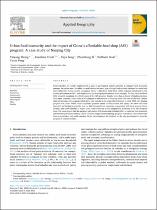| dc.contributor.author | Zhong, Taiyang | |
| dc.contributor.author | Crush, Jonathan | |
| dc.contributor.author | Song, Yaya | |
| dc.date.accessioned | 2023-06-23T13:15:08Z | |
| dc.date.available | 2023-06-23T13:15:08Z | |
| dc.date.issued | 2023 | |
| dc.identifier.citation | Zhong, T., Crush, J., Song, Y., Si, Z., Scott, S. and Peng, Y., 2023. Urban food insecurity and the impact of China's affordable food shop (AFS) program: A case study of Nanjing City. Applied Geography, 154, p.102924. | en_US |
| dc.identifier.issn | 0143-6228 | |
| dc.identifier.uri | http://hdl.handle.net/10566/9143 | |
| dc.description.abstract | Food subsidies are widely implemented as part of government policies globally to mitigate food insecurity amongst the urban poor. Subsidies to retail outlets are one a type of supply-side subsidy designed to make food more affordable to low-income consumers. China’s Affordable Food Shop (AFS) program introduced by the central government in 2011 and implemented by municipal governments is one example. To date, there has been little research examining the effectiveness of the AFS program despite more than a decade of implementation. This paper presents a case study of the program’s effectiveness in Nanjing which was one of the first Chinese cities to introduce the program which grew very rapidly in the years that followed. In early 2020, the Nanjing program was closed which raises important questions about its effectiveness and impact. We show that food insecurity in Nanjing is generally low but that increased food insecurity is associated with lived poverty, lower income, and unaffordability of staple foods. Food insecurity is not mitigated by proximity to an AFS Program shop. The paper argues that the program had various deficiencies and a limited effect in reducing food insecurity and increasing food accessibility. These included inappropriate targeting, program redundancy, and competition from supermarkets and public markets. In the circumstances, the decision by the city government to close the program is understandable. | en_US |
| dc.language.iso | en | en_US |
| dc.publisher | Applied Geography | en_US |
| dc.subject | Food access | en_US |
| dc.subject | Food security | en_US |
| dc.subject | Food subsidie | en_US |
| dc.subject | AFS Program | en_US |
| dc.subject | China | en_US |
| dc.title | Urban food insecurity and the impact of China’s affordable food shop (AFS) program: a case study of Nanjing City | en_US |
| dc.type | Article | en_US |

